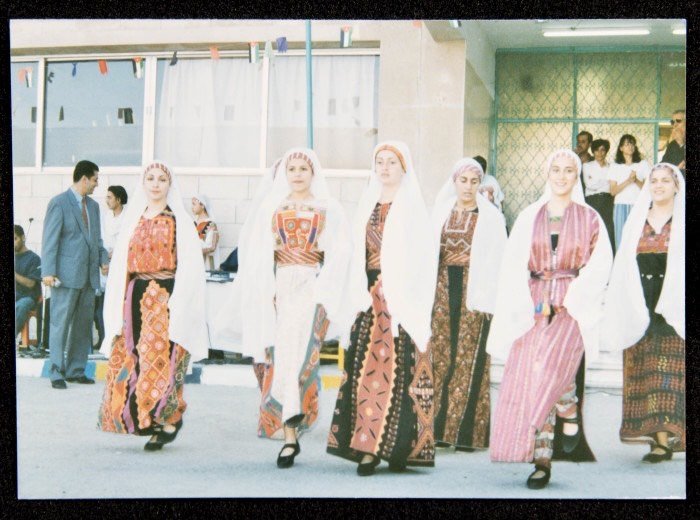Anti-Colonial Work is a Marathon & A Sprint
photo of the Hannouneh Troupe performing in the yard of the Arab Model Schools in Amman. Photo is from the al-Hannouneh Society for Popular Culture Collection of The Palestinian Museum Digital Archive.
First, In Solidarity
We hope this note finds you in good health. We are sending love to every person reading this letter.
Over the past 3 months, we have found our hearts broken open and sorrowful, along with agitated to action regarding the ongoing genocide and ethnic cleansing of Palestinians.
We wanted to check in with a few reflections and offer some of our suggestions for immediate and sustained actions.
As the self-proclaimed, International Girl Gang, decolonization is something that has been at the root of Women.Weed.WiFi since our inception in 2015. When we brainstormed about what we wanted our collective to look like over a blunt in the former Princess Palace, it was important that we highlighted the cultural and historical aspects of plant medicine and holistic healing, and that our personal and interconnected struggles and liberations were at the forefront of our art and events. Decolonizing our medicine and the way we heal ourselves is what led us to forming our Smoke + Stretch sessions, publishing our open-submission zines, and has been the base of all of our curated events over the last several years.
Intersectionality at the root of Black feminism is something that has long set us apart from many other "women and weed" groups, and is also exactly what draws so many to us-- the understanding that there has never been any real way to talk about cannabis, or any Woman's issue, without acknowledging race, class, and geopolitics.
As holistic healers and students of many mediums -- cannasauers, yoga teachers, birth doulas, reiki practitioners, meditation leaders, writers, mothers, and artists-- we take our calling very seriously. Any true holistic healer is bound by the first word, "holistic". This means that we are taking approaches to health and liberation that consider and address individual and collective needs, along with what is best for our beloved planet Earth.
In the case of Palestine, we understand as daughters and defenders of lands and people that have been colonized, we have not only shared experiences of humiliation, degradation, and exploitation at the hands of imperialism, but a shared responsibility to aid our global cousins in their liberation.
What Can We Do?
This is by no means an exhaustive list, but these are very good starting points if you, like us, feel called to assist in collective liberation, but may be wondering where to start or what is impactful.
Note, anti-colonial work is no different than any other type of work that asks us to examine our own biases, privileges, and implications in the thing we seek to destroy. As much outer work as there is to do, there is an equal amount of inner work to be done. It involves challenging the way you think, speak, dress, eat, love, educate, and show up for those in your day to day lives. It is daily and it is never-ending...
Palestinians have asked us to keep viewing and sharing their stories from on the ground and globally in the diaspora. As we know, much of Western media is heavily biased in favor of the Israeli Apartheid state and offers very little actual coverage of what the situation on the ground is. In this digital age, brave Palestinian journalists have given us access to hourly updates from inside Gaza-- viewing with your own eyes and amplifying these voices instead of depending solely on the accounts of those interested in perpetuating violence is a great place to start. Not turning away from the ongoing slaughter of innocent lives is the bare minimum. Some journalists in Gaza to follow are: @wizard_bisan1 ; @motaz_azaiza ; @wael_eldahdouh ; @solimanhijjy ; @bayanpalestine ; @lama_jamous9
Palestinians have asked us (especially in the USA) to call and email our elected representatives, and call for an immediate and urgent de-escalation and ceasefire in Gaza. This is actually a very easy step to do from the comfort of your own home and takes no more than 5 minutes to complete! If you have yet to call or email your reps this is a direct invitation to do so, and if you have already called, this is an invitation to do it again and again. The 5Calls app and website make this exceedingly simple and easy -- just enter your zip code and it will tell you who your reps are and provide you their numbers/ email addresses, as well as basic templates to speak from (of course you can personalize your messages).
Palestinians have asked us to boycott, divest, and sanction companies complicit in Israel's decades-long apartheid and current genocide in Palestine. This is also lowkey very easy to do, despite what internet trolls would have you believe. You literally just don't buy something... The BDS website has a full list of companies selected for a targeted boycott and divestment. Most of the companies on the list are also complicit in the murder of the planet and degradation of life for many across the globe, so byeeee. It's good to check this list often so that company names become committed to memory, as well as checking before setting out to shop or order something online. To keep it simple, put your money where your mouth is.
Anti-Colonial work requires us to invest in our local communities and foster these connections. The phrase, "Think global, act local," is literally facts bro. The more we are able to heal ourselves, feed ourselves, educate ourselves, economically sustain ourselves, the less dependent we as individuals and collectives will be upon the predatory systems of capitalism and imperialism. Great ways to start acting more locally include buying food directly from farmers at farmers markets, buying clothes and goods from local artists and designers, getting services/goods from small businesses instead of large corporations, bartering and trading where you can, and supporting the mothers and children in your circle, duh.
Anti-colonial work requires continued education at the individual and collective levels on Palestine as well as the widespread histories of colonization and its many global resistances. Like a sweater, pulling on one thread inevitably pulls you to other connected issues. Understanding that there is always more to learn and teach keeps us active and also helps prevent falling into ego traps in the search for freedom.
We'd love to hear back from you with any comments or resources you may have!
In love and solidarity,
Women.Weed.WiFi




